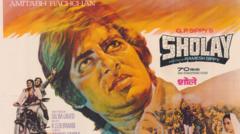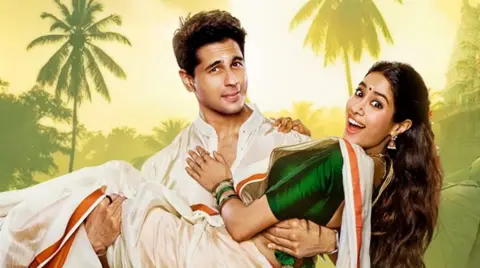Sholay, widely regarded as a cinematic masterpiece, is making a grand return to the big screen fifty years after its initial release. The fully restored and uncut version of Ramesh Sippy's 1975 epic will debut at the renowned Il Cinema Ritrovato Festival in Bologna, Italy, on Friday. This release includes the film's original ending, which had been altered due to censorship at the time, along with previously deleted scenes. The festival's stunning open-air screening in Piazza Maggiore, one of Europe's largest screens, serves as the perfect backdrop for this highly anticipated re-launch.
Initially, the film was a labor of love for the writer duo Salim-Javed and featured an all-star cast, including the likes of Amitabh Bachchan, Dharmendra, Hema Malini, Jaya Bhaduri, Sanjeev Kumar, and the unforgettable Amjad Khan as the villain Gabbar Singh. Sholay masterfully weaves elements from Western and samurai films into an Indian context, offering a gripping narrative set in the fictional village of Ramgarh. The film follows the journey of two bandits, Jai and Veeru, who are enlisted by Thakur Baldev Singh to defeat the dangerous bandit Gabbar Singh.
Despite a rocky start at the box office, Sholay eventually became a phenomenal success, running for over five years at Mumbai's Minerva theatre. It has since been celebrated as "Film of the Millennium" and remains a cultural touchstone in India. The dialogues from the film are still widely quoted and referenced in several contexts, and its music, composed by RD Burman, continues to captivate audiences.
The lengthy journey of restoring Sholay was not without challenges. The original 70mm prints had not survived, and the camera negatives were highly deteriorated. However, in 2022, Shehzad Sippy, son of Ramesh Sippy, collaborated with the Film Heritage Foundation to breathe new life into the film. The endeavor uncovered valuable materials in Mumbai and the UK that were crucial for the restoration process.
Despite its rough beginnings, Sholay's music and visuals found their place in the hearts of viewers, and its characters became deeply embedded in Indian culture. The film’s enduring legacy speaks to its central theme of the triumph of good over evil, summing up what makes it an evergreen classic, as Amitabh Bachchan noted, “the victory of good over evil and poetic justice in three hours.”
Initially, the film was a labor of love for the writer duo Salim-Javed and featured an all-star cast, including the likes of Amitabh Bachchan, Dharmendra, Hema Malini, Jaya Bhaduri, Sanjeev Kumar, and the unforgettable Amjad Khan as the villain Gabbar Singh. Sholay masterfully weaves elements from Western and samurai films into an Indian context, offering a gripping narrative set in the fictional village of Ramgarh. The film follows the journey of two bandits, Jai and Veeru, who are enlisted by Thakur Baldev Singh to defeat the dangerous bandit Gabbar Singh.
Despite a rocky start at the box office, Sholay eventually became a phenomenal success, running for over five years at Mumbai's Minerva theatre. It has since been celebrated as "Film of the Millennium" and remains a cultural touchstone in India. The dialogues from the film are still widely quoted and referenced in several contexts, and its music, composed by RD Burman, continues to captivate audiences.
The lengthy journey of restoring Sholay was not without challenges. The original 70mm prints had not survived, and the camera negatives were highly deteriorated. However, in 2022, Shehzad Sippy, son of Ramesh Sippy, collaborated with the Film Heritage Foundation to breathe new life into the film. The endeavor uncovered valuable materials in Mumbai and the UK that were crucial for the restoration process.
Despite its rough beginnings, Sholay's music and visuals found their place in the hearts of viewers, and its characters became deeply embedded in Indian culture. The film’s enduring legacy speaks to its central theme of the triumph of good over evil, summing up what makes it an evergreen classic, as Amitabh Bachchan noted, “the victory of good over evil and poetic justice in three hours.”



















